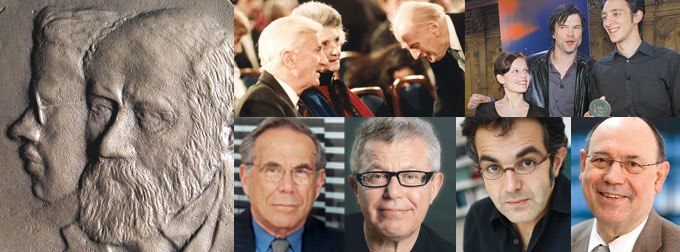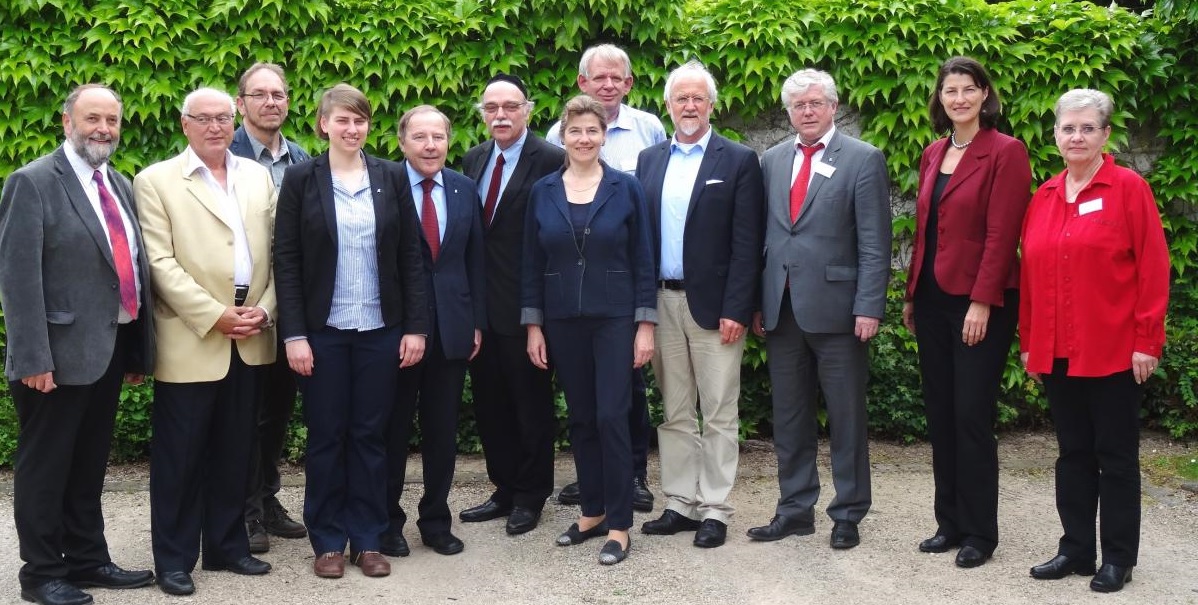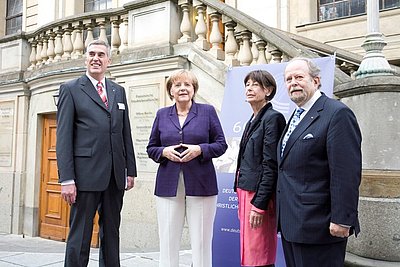Germany
Gesellschaften für Christlich-Jüdische Zusammenarbeit - Deutscher Koordinierungsrat e.V. (DKR)
History
Country:
Germany
Organization name:
Gesellschaften für Christlich-Jüdische Zusammenarbeit - Deutscher Koordinierungsrat e.V. (DKR)
Preferred English translation of the name of your organization:
The German Coordinating Council of Christian-Jewish Cooperation
Year of establishment or foundation of the organization:
1949
Brief history of the organization:
After WW II, the founding of the first Associations of Christian-Jewish Cooperation in Germany was initiated by already existing National Councils of Christian-Jewish Cooperation in the United States, the UK, France and Switzerland. As part of the re-education program for the still young German democracy, the U.S. financially supported the founding and development of the first associations.
Associations in Munich, Wiesbaden, Frankfurt M., Stuttgart and Berlin were the first to be founded in 1948/49. These established on November 10th 1949 the Deutscher Koordinierungsrat in Bad Nauheim. Currently there exist 85 local associations throughout Germany. After the reunification of Germany in 1989 associations were founded in the Eastern part of Germany as well.
Number of members (approx.):
85 local associations with around 17.000 members in Germany
Where is your organization based?
Our office is based in Bad Nauheim (north of Frankfurt a.M.)
Activities
Main focuses/areas of your work:
Our mission statement, preamble, states:
- Founded in the biblical tradition we are convinced that neither the government nor the established religions have a right to curtail a person’s right to live in freedom regardless of faith, race, or gender
Thus we focus on:
- promoting understanding and cooperation between Christians and Jews based on mutual respect for each other's religious identity and tradition
- reminding the Churches of their long Anti-Jewish theology, and their need to overcome the theology of supercessionism
- addressing issues of human rights and human dignity based on the traditions of Judaism and Christianity
- supporting and facilitating Jewish Life in Germany and preserving all traces of Jewish Life in Germany before the Holocaust
- recognizing the State of Israel as the Jewish homestead
- opposing all forms of antisemitism and antizionism, discrimination based on gender, race or religion
- coordinating national activities through conferences, lectures and workshops held regularly in different cities of Germany
- encouraging research and education on Christian-Jewish topics for students, teachers, religious representatives
- facilitating theological discussions
Which audiences do you work towards?
Academics; grassroots; young professionals; retired professionals; clergy; students.
How often does your organization meet?
- January: Special Board Meeting to determine the recipient of the Buber-Rosenzweig Medal and the annual theme
- March: National Brotherhood Week
- June: Annual General Meeting
- September: Conference of the directors of all 85 member organizations at which the board is present
- November: Rabbi Brandt lecture
- Ca. 6 board meetings a year
- Ca. 6 meetings of the three Presidents
Events regularly sponsored by your organization:
The annually “Woche der Brüderlichkeit” (National Week of Brotherhood) which begins with a grand opening ceremony which is hosted each year by a city in which one of the 82 member associations is located. This event offers the opportunity for politicians and Church Leaders to connect with the people as well as to engage in the interreligious dialogue between Christians and Jews and Muslims. During this popular event the “Buber-Rosenzweig Medal ” is awarded to a person or institution especially active in fostering the dialogue between Christians and Jews. The National Brotherhood opens with a grand ceremony that is televised nationwide, and makes the national evening news. It begins on Friday evening with Kabalat Shabbat in the local Jewish Community. On Saturday there is usually a lecture by the recipient of the Buber-Rosenzweig Medal, and a Christian-Jewish spiritual ceremony with Christian and Jewish religious leaders. The local organization of the respective city offers a yearly program of lectures, exhibits, musical events, and many other features.
Besides the National Brotherhood Week the DKR hosts three national and international Conferences annually. We issue statements concerning political, religious and cultural issues that concern our mission. We are invited to and are present at each of the main Political Party Congresses as well as at the Protestant and Catholic Kirchentag (church conventions) each year. The respective Bundespräsident (Federal President) is our Patron, which gives us a strong political standing in Berlin. In November we also organize the annual Rabbi-Brandt-Lecture in a different city focusing on political issues from a Christian-Jewish viewpoint.
For a couple of years we have enabled two researchers per year to hold a teaching assignment called “Buber-Rosenzweig-Lehrauftrag” for one Semester at a German university. One is focused on Christian-Jewish Dialogue, the other one on Antisemitism.
Does your organization have any regular publications (in print or online)?
The annual “Themenheft” (theme magazine) is a platform for offering a Christian- Jewish perspective on current events and answers to difficult questions on controversial topics. It focuses on aspects of our annual theme that serves as a “headline” over our work for twelve months. While trying to stir a conversation in society we also try to offer information through an informative, sometimes controversial and yet entertaining magazine.
Another publication is the annually published “WdB (Week of brotherhood) Documentation” including speeches, sermons, newspaper articles and photos of events that took place during the weekend of National Brotherhood Week.
Has your organization figured in any published material such as newspapers, books or blogs?
We have been featured in many publications, all, alas, in German, but the yearly documentation of the National Brotherhood Week has a large sampling of media reports.

Organization
Main working/publishing languages of your organization:
German
Officers of your organization:
Presidents:
Rev. Friedhelm Pieper, Protestant President
Rabbi Andreas Nachama, Jewish President
Dr. Margaretha Hackermeier, Catholic President
Treasurer:
Rev. Heinz Daume
Additional members of board:
Rabbi Jehoshua Ahrens, Gerda Koch, Dr. Bettina Kratz-Ritter, Fr. Elias H. Füllenbach OP, Dr. Abi Pitum, Rev. Rien van der Vegt, and Nina Pape (Young Leadership)
General Secretary:
Rev. Ilona Klemens
Briefly describe your organization’s relationship to the ICCJ:
The DKR has a special relationship to the ICCJ through its liaison officer. This position, due to the fact that the ICCJ’s main office is located in Heppenheim makes for a close relationship. The GS of the DKR and the ICCJ are in regular contact. Members of the ICCJ board have published in our “Themenheft” (theme magazine); the GS of the ICCJ are always invited of our Conferences. Through the ICCJ the DKR has the chance to broaden its view on Christian-Jewish Dialogue and profits from our close contact to our international roof organization.
What is the greatest challenge your organization faces at the moment?
How to combat the continous as well as the rising problem of antisemitism, racism and discrimination in our society?
How to involve younger people, Jews and Christians, to join our organizations or become engaged in our mission?
How can we ensure that the work of Christina-Jewish Dialogue reaches a society that is increasingly secular and often suspicious of religion?
Is your organization active on Social Media platforms? If yes, which ones and how can one reach you there?
Facebook / Twitter / Youtube
E-mail address to contact your organization:
info(at)deutscher-koordinierungsrat.de
Website of your organization:
www.deutscher-koordinierungsrat.de






